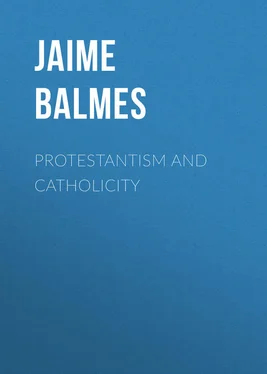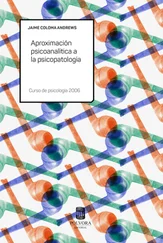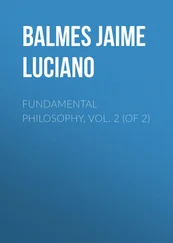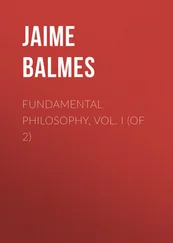Jaime Balmes - Protestantism and Catholicity
Здесь есть возможность читать онлайн «Jaime Balmes - Protestantism and Catholicity» — ознакомительный отрывок электронной книги совершенно бесплатно, а после прочтения отрывка купить полную версию. В некоторых случаях можно слушать аудио, скачать через торрент в формате fb2 и присутствует краткое содержание. Жанр: foreign_antique, foreign_prose, на английском языке. Описание произведения, (предисловие) а так же отзывы посетителей доступны на портале библиотеки ЛибКат.
- Название:Protestantism and Catholicity
- Автор:
- Жанр:
- Год:неизвестен
- ISBN:нет данных
- Рейтинг книги:3 / 5. Голосов: 1
-
Избранное:Добавить в избранное
- Отзывы:
-
Ваша оценка:
- 60
- 1
- 2
- 3
- 4
- 5
Protestantism and Catholicity: краткое содержание, описание и аннотация
Предлагаем к чтению аннотацию, описание, краткое содержание или предисловие (зависит от того, что написал сам автор книги «Protestantism and Catholicity»). Если вы не нашли необходимую информацию о книге — напишите в комментариях, мы постараемся отыскать её.
Protestantism and Catholicity — читать онлайн ознакомительный отрывок
Ниже представлен текст книги, разбитый по страницам. Система сохранения места последней прочитанной страницы, позволяет с удобством читать онлайн бесплатно книгу «Protestantism and Catholicity», без необходимости каждый раз заново искать на чём Вы остановились. Поставьте закладку, и сможете в любой момент перейти на страницу, на которой закончили чтение.
Интервал:
Закладка:
It was then found that the best things may be abused, and that these divine volumes, which contain so much instruction for the mind, and so much consolation for the heart, are full of danger to the proud. How great will this be, if you add to the obstinate resolution of resisting all authority in matters of faith, the false persuasion that the meaning of the Scriptures is everywhere clear, and that, in all cases, the inspirations of Heaven may be expected to solve every doubt? What will happen to those who turn over their pages with a longing desire to find some text which, more or less tortured, may seem to authorize their sophisms, subtilties, and absurdities?
There never was a greater mistake than that which was committed by the Protestant leaders, when they placed the Bible in the hands of all for self-interpretation; never was the nature of that sacred volume more completely lost sight of. It is true that Protestantism had no other method to pursue, and that every objection which it could make to the private interpretation of the sacred text would be a striking inconsistency, an apostasy from its own principles, and a denial of its own origin; but at the same time, this is its most decided condemnation. What claim, indeed, can that religion have to truth and sanctity whose fundamental principle contains the germ of sects the most fanatical – the most injurious to society?
It would be difficult to collect into so narrow a space, in opposition to this essential error of Protestantism, so many facts and convincing proofs of this, as are contained in the following lines, written by a Protestant, O'Callaghan, which, I have no doubt, my readers will thank me for quoting here. "Led away," says O'Callaghan, "by their spirit of opposition to the Church of Rome, the first Reformers loudly proclaimed the right of interpreting the Scriptures according to each one's private judgment; but in their eagerness to emancipate the people from the authority of the Pope, they proclaimed this right without explanation or restriction: and the consequences were fearful. Impatient to undermine the papal jurisdiction, they maintained without exception, that each individual has an incontestable right to interpret the Scriptures for himself; and as this principle, carried to the fullest extent, was not sustainable, they were obliged to rely for support upon another, viz. that the Bible is an easy book, within the comprehension of all minds, and that the divine revelations contained in it are always clear to all; two propositions which, whether we consider them together or apart, cannot withstand a serious attack.
"The private judgment of Muncer found in the Scriptures that titles of nobility and great estates are impious usurpations, contrary to the natural equality of the faithful, and he invited his followers to examine if this were not the case. They examined into the matter, praised God, and then proceeded by fire and sword to extirpate the impious and possess themselves of their properties. Private judgment made the discovery in the Bible that established laws were a permanent restriction on Christian liberty; and, behold, John of Leyden, throwing away his tools, put himself at the head of a mob of fanatics, surprised the town of Munster, proclaimed himself king of Sion, and took fourteen wives at a time, asserting that polygamy is Christian liberty, and the privilege of the saints. But if the criminal madness of these men in another country is afflicting to the friends of humanity and of real piety, certainly the history of England, during a great part of the seventeenth century, is not calculated to console them. During that period an immense number of fanatics appeared, sometimes together and sometimes in succession, intoxicated with extravagant doctrines and mischievous passions, from the fierce ravings of Fox to the more methodical madness of Barclay; from the formidable fanaticism of Cromwell to the silly profanity of 'Praise God Barebones.' Piety, reason, and good sense seemed to be extinct on earth, and to be succeeded by an extravagant jargon, a religious frenzy, and a zeal without discretion. All quoted the Scriptures, all pretended to have had inspirations, visions, and spiritual ecstasies, and all, indeed, had equal claims to them. It was strongly maintained that it was proper to abolish the priesthood and the royal dignity, because priests were the ministers of Satan, and kings the delegates of the whore of Babylon, and that the existence of both were inconsistent with the reign of the Redeemer. The fanatics condemned science as a Pagan invention, and universities as seminaries of antichristian impiety. Bishops were not protected by the sanctity of their functions, or kings by the majesty of the throne; both, as objects of contempt and hatred, were mercilessly put to death by these fanatics, whose only book was the Bible, without note or comment. During this time, the enthusiasm for prayer, preaching, and the reading of the sacred books was at the highest point; everybody prayed, preached, and read, but nobody listened. The greatest atrocities were justified by the Scriptures; in the most ordinary transactions of life, scriptural language was made use of; national affairs, foreign and domestic, were discussed in the phraseology of Holy Writ. There were scriptural plots, conspiracies, and proscriptions; and all this was not only justified but even sanctified by quotations from the word of God. These facts, attested by history, have often astonished and alarmed men of virtue and piety, but the reader, too much imbued with his own ideas, forgets the lesson to be learnt by this fatal experience; namely, that the Bible without note or comment was not intended to be read by rude and ignorant men .
"The majority of mankind must be content to receive the instructions of others, and are not enabled to trust themselves. The most important truths in medicine, in jurisprudence, in physics, in mathematics, must be received from those who drink at the fountain head. The same plan has in general been pursued with respect to Christianity; and whenever the departure from it has been wide enough, ' society has been shaken to its foundation .'"
These words of O'Callaghan do not require any comment. It cannot be said that they are hyperbolical or declamatory, as they are only a simple and faithful narration of acknowledged facts. The recollection of these events should suffice to prove the danger of placing the sacred Scriptures, without note or comment, into the hands of all, as Protestantism does, under the pretence, that the authority of the Church is useless for understanding the holy books; and that every Christian has only to listen to the dictates which generally emanate from his passions and heated imagination. By this error alone, if it had committed no other, Protestantism is self-reproved and condemned; for it is a religion which has established a principle destructive to itself. In order to appreciate the madness of Protestantism on this point, and to see how false and dangerous is the position which it has assumed with regard to the human mind, it is not necessary to be a theologian, or a Catholic; it is enough to have read the Scriptures with the eyes of a philosopher or a man of literature. Here is a book which comprises, within a limited compass, the period of four thousand years, and advances further towards the most distant future, by embracing the origin and destiny of man and the universe – a book which, with the continued history of a chosen people, intermingles, in its narrations and prophecies, the revolutions of mighty empires – a book which, side by side with the magnificent pictures of the power and splendor of Eastern monarchs, describes, in simple colors, the plain domestic manners, the candor, and innocence of a young nation – a book in which historians relate, sages proclaim their maxims of wisdom, apostles preach, and doctors instruct – a book in which prophets, under the influence of the divine Spirit, thunder against the errors and corruptions of the people, and announce the vengeance of the God of Sinai, or pour forth inconsolable lamentations on the captivity of their brethren, and the desolation and solitude of their country; where they relate, in wonderful and sublime language, the magnificent spectacles which are presented to their eyes; where, in moments of ecstasy, they see pass before them the events of society and the catastrophes of nature, although veiled in mysterious figures and visions of obscurity – a book, or rather a collection of books, where are to be found all sorts of styles and all varieties of narrative, epic majesty, pastoral simplicity, lyric fire, serious instruction, grave historical narrative, and lively and rapid dramatic action; a collection of books, in fine, written at various times and in various languages, in various countries, and under the most peculiar and extraordinary circumstances. Must not all this confuse the heads of men who, puffed up with their own conceit, grope through these pages in the dark, ignorant of climates, times, laws, customs, and manners? They will be puzzled by allusions, surprised by images, deceived by expressions; they will hear the Greek and Hebrew, which was written in those remote ages, now spoken in a modern idiom. What effects must all these circumstances produce on the minds of readers who believe that the Bible is an easy book, to be understood without difficulty by all? Persuaded that they do not require the instructions of others, they must either resolve all these difficulties by their own reflections, or trust to that individual inspiration which they believe will not be wanting to explain to them the loftiest mysteries. Who, after this, can be astonished that Protestantism has produced so many absurd visionaries and furious fanatics? 11 Конец ознакомительного фрагмента. Текст предоставлен ООО «ЛитРес». Прочитайте эту книгу целиком, купив полную легальную версию на ЛитРес. Безопасно оплатить книгу можно банковской картой Visa, MasterCard, Maestro, со счета мобильного телефона, с платежного терминала, в салоне МТС или Связной, через PayPal, WebMoney, Яндекс.Деньги, QIWI Кошелек, бонусными картами или другим удобным Вам способом.
Интервал:
Закладка:
Похожие книги на «Protestantism and Catholicity»
Представляем Вашему вниманию похожие книги на «Protestantism and Catholicity» списком для выбора. Мы отобрали схожую по названию и смыслу литературу в надежде предоставить читателям больше вариантов отыскать новые, интересные, ещё непрочитанные произведения.
Обсуждение, отзывы о книге «Protestantism and Catholicity» и просто собственные мнения читателей. Оставьте ваши комментарии, напишите, что Вы думаете о произведении, его смысле или главных героях. Укажите что конкретно понравилось, а что нет, и почему Вы так считаете.












